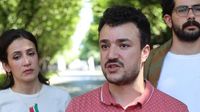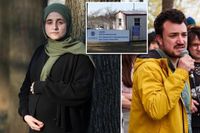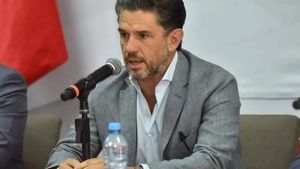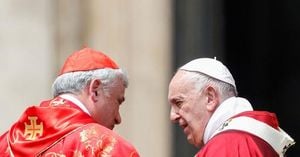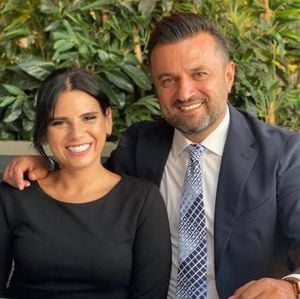On Monday, April 21, 2025, Mahmoud Khalil’s wife, Dr. Noor Abdalla, welcomed their first child into the world, but the moment was bittersweet as Khalil remained in a Louisiana detention center, denied temporary release by Immigration and Customs Enforcement (ICE) to be present for the birth. This separation highlights the ongoing struggles faced by families affected by immigration policies, particularly under the Trump administration.
Dr. Abdalla, a 28-year-old dentist, delivered their son in New York City, while Khalil, a 30-year-old Columbia University graduate, was held over 1,000 miles away. Khalil's legal team had requested a two-week furlough from ICE to allow him to be with his wife during this significant moment. However, the request was swiftly denied by Melissa Harper, the director of ICE’s field office in New Orleans, just 30 minutes after it was submitted. Abdalla expressed her anguish in a statement, saying, "This was a purposeful decision by ICE to make me, Mahmoud, and our son suffer."
Khalil, who has been in detention since March 8, 2025, was targeted for his vocal support of Palestinian rights and his role as the lead negotiator for a pro-Palestinian encampment at Columbia University last year. The Trump administration’s actions against him have drawn criticism and raised concerns about the treatment of individuals involved in political advocacy.
Upon his arrest, the Trump administration revoked Khalil’s green card, leading to his immediate transfer to a detention facility in Louisiana. His case has become emblematic of the administration's broader crackdown on visa holders who engage in pro-Palestinian efforts. An immigration judge recently ruled that Khalil could be deported, though his attorneys are in the process of appealing the decision.
In her statement following the birth, Abdalla reiterated her commitment to fighting for her husband’s release. "I will continue to fight every day for Mahmoud to come home to us. I know when Mahmoud is freed, he will show our son how to be brave, thoughtful, and compassionate, just like his dad," she said. This sentiment reflects the deep emotional toll that the separation has taken on their family.
The couple has been together for two years, and Abdalla had hoped Khalil would be free in time to witness the birth of their child. "I think it would be very devastating for me and for him to meet his first child behind a glass screen. I’ve always been so excited to have my first baby with the person I love," she previously shared.
As Khalil remains in detention, he was able to experience the birth of his son through a phone call, a stark contrast to the joyous moment he had envisioned being part of. His lawyers had suggested alternatives that would allow him to attend the birth, such as wearing an ankle monitor and checking in regularly, but these options were dismissed by ICE.
Abdalla, born and raised in Michigan to Syrian immigrant parents, has been vocal about the injustices faced by her husband and others in similar situations. She has stated that the administration’s actions are aimed at silencing dissent against U.S. foreign policy regarding Palestine. "We will not be silenced. We will persist, with even greater resolve, and we will pass that strength on to our children and our children’s children – until Palestine is free," she proclaimed on April 8, 2025.
The couple's story sheds light on the broader implications of immigration policies and their impact on families. Khalil’s detention is not just a personal tragedy; it reflects a systemic issue that affects many who dare to speak out against governmental policies. As the legal battle continues, supporters of Khalil and Abdalla are rallying around their cause, advocating for Khalil’s release and highlighting the need for reform in immigration practices.
With the ongoing appeal process, uncertainty looms over Khalil’s future in the United States. His case has garnered attention not only for its implications regarding immigration policy but also for the personal suffering it has caused. As families like Khalil and Abdalla’s navigate these challenges, the struggle for justice and humane treatment continues.
The emotional weight of Khalil's absence during such a pivotal moment in their lives underscores the urgent need for compassionate immigration reform. Advocates argue that no family should have to endure such separation during critical life events. As the fight for Khalil’s release continues, his supporters remain hopeful that he will soon be reunited with his family, allowing them to create memories together as they welcome their son into the world.
